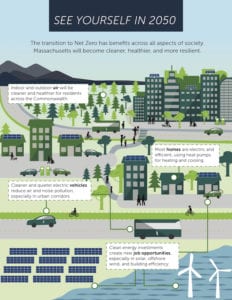Who is a member?
Our members are the local governments of Massachusetts and their elected and appointed leadership.

The administration recently released a 2050 Decarbonization Roadmap to identify strategies to ensure that Massachusetts reduces greenhouse gas emissions by at least 85% by 2050 and achieves net-zero emissions.
The Executive Office of Energy and Environmental Affairs has extended the comment period on its draft 10-year Clean Energy and Climate Plan through March 22.
The 50-page document, released on Dec. 30, details the actions to be taken in Massachusetts over the next decade to ensure that the state achieves a 2030 greenhouse gas emissions target of 45% below 1990 levels.
The state’s Global Warming Solutions Act, enacted in 2008, requires Energy and Environmental Affairs to set emissions limits every 10 years and to develop implementation plans to meet them. The 2030 plan builds on the Clean Energy and Climate Plan for 2020, published in 2010, and an update published in 2015.
The Executive Office of Energy and Environmental Affairs states that the plan must ensure that the emissions limit “maximizes the Commonwealth’s ability to meet its 2050 limit and consider the feasibility, cost-effectiveness, and enforceability of [greenhouse gas] reduction measures, along with their co-benefits, for achieving said limit.”
Last April, the administration signed a formal letter of determination establishing “net zero” greenhouse gas emissions as the Commonwealth’s new legal emissions limit for 2050.
The draft 2030 Clean Energy and Climate Plan describes four key pillars of the state’s decarbonization effort:
• Transitioning buildings, vehicles, and other end uses away from consuming fossil fuels
• Aggressively pursuing energy efficiency and flexibility to enable cost-effective decarbonization
• Producing zero and low-carbon supplies to power our energy system
• Balancing remaining emissions by facilitating carbon dioxide removal from the atmosphere
The draft and supporting materials are available at www.mass.gov/info-details/massachusetts-clean-energy-and-climate-plan-for-2030.
Energy and Environmental Affairs is welcoming all comments on the draft, though specific feedback on the sector strategies would be most helpful to inform the finalization of the plan.
The MMA plans to submit comments. Questions or input can be sent to Ariela Lovett at [email protected].
The administration also released a 2050 Decarbonization Roadmap intended to identify cost-effective and equitable strategies to ensure that Massachusetts reduces greenhouse gas emissions by at least 85% by 2050 and achieves net-zero emissions.
In order to achieve net zero, the emissions that remain after reduction efforts must be removed from the atmosphere and stored using carbon capture or sequestration technologies.